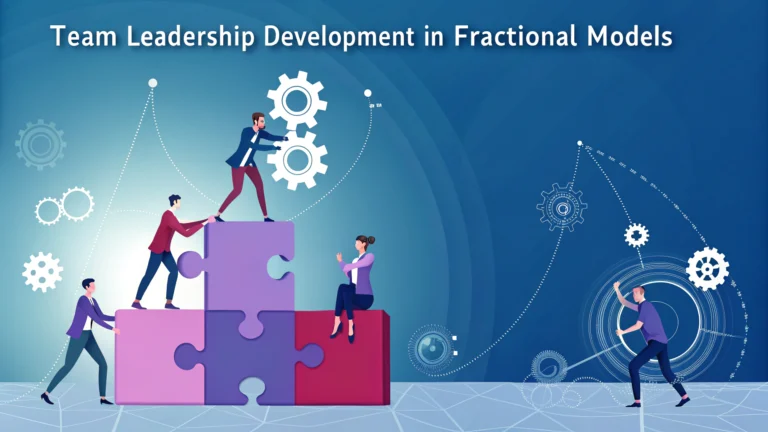Leadership development takes on new dimensions when applied to fractional executive roles, particularly for Chief Operating Officers who work across multiple organizations.
Building and maintaining high-performing teams becomes more complex when leadership is shared or part-time, requiring specialized approaches and strategies.
This guide explores effective methods for developing leadership capabilities within fractional COO models, focusing on practical solutions for common challenges.
Core Leadership Principles for Fractional COOs
- Clear communication protocols
- Defined decision-making frameworks
- Structured accountability systems
- Remote team management skills
- Time allocation strategies
Setting Up Leadership Systems
Each organization needs a tailored leadership structure that functions effectively during both presence and absence periods.
Key Components:
- Documented processes and procedures
- Regular check-in schedules
- Emergency response protocols
- Performance tracking metrics
Building Team Trust
Trust becomes paramount when leadership operates on a fractional basis.
Trust-Building Strategies:
- Consistent communication schedules
- Transparent decision-making processes
- Regular feedback sessions
- Clear availability windows
Technology Tools for Fractional Leadership
| Tool Type | Recommended Solutions |
|---|---|
| Project Management | Asana, Monday.com, Trello |
| Communication | Slack, Microsoft Teams, Zoom |
| Document Sharing | Google Workspace, SharePoint |
Measuring Leadership Effectiveness
Regular assessment of leadership impact helps maintain and improve team performance.
Key Performance Indicators:
- Team productivity metrics
- Employee satisfaction scores
- Project completion rates
- Communication effectiveness
Professional Development Resources
Continuous learning supports effective fractional leadership.
Recommended Resources:
- Fractional COO Association
- LinkedIn Learning Leadership Courses
- Harvard Executive Education Programs
Moving Forward with Fractional Leadership
Success in fractional leadership roles requires adaptability, clear systems, and ongoing commitment to team development.
For additional support and resources, contact professional fractional COO networks or schedule a consultation with experienced practitioners in the field.
Optimizing Remote Leadership Impact
Fractional COOs must develop strategies to maintain influence and effectiveness even when not physically present.
Key Remote Leadership Elements:
- Virtual presence optimization
- Asynchronous communication mastery
- Digital collaboration techniques
- Cross-cultural management skills
Crisis Management in Fractional Roles
Establishing robust crisis response systems ensures continuity during critical situations.
Essential Components:
- Designated emergency contacts
- Decision-making hierarchies
- Backup leadership plans
- Communication cascades
Scaling Leadership Impact
Effective fractional leadership requires systems that can scale across multiple organizations while maintaining quality.
Scaling Strategies:
- Standardized operating procedures
- Replicable management frameworks
- Automated reporting systems
- Cross-organization best practices
Empowering Future Fractional Leaders
The evolution of fractional leadership continues to shape modern business operations. Success depends on building resilient systems, maintaining clear communication channels, and fostering strong team relationships across multiple organizations.
Final Action Steps:
- Implement structured leadership frameworks
- Leverage technology solutions effectively
- Maintain continuous learning practices
- Build strong professional networks
FAQs
- What is a fractional COO’s role in team leadership development?
A fractional COO provides part-time executive leadership, focusing on developing team capabilities, implementing leadership frameworks, and establishing management processes while working with organizations on a flexible schedule. - How does a fractional leadership model benefit team development?
The fractional model allows organizations to access high-level leadership expertise at a reduced cost, providing targeted guidance for team development while maintaining flexibility in resource allocation and strategic implementation. - What are the key components of team leadership development in a fractional model?
Key components include skills assessment, leadership training programs, mentorship structures, performance metrics establishment, communication protocols, and strategic alignment of team objectives with organizational goals. - How long does it typically take to see results in team development with a fractional COO?
Initial improvements can be observed within 3-6 months, with sustainable team development outcomes typically manifesting within 6-12 months, depending on the organization’s size and existing leadership structure. - What metrics are used to measure successful team leadership development?
Success metrics include employee engagement scores, productivity measures, retention rates, leadership competency assessments, team performance indicators, and achievement of established organizational objectives. - How does a fractional COO balance multiple team development initiatives across different organizations?
Fractional COOs utilize structured frameworks, documented processes, and clear communication channels to manage multiple initiatives, typically dedicating specific days or time blocks to each organization’s leadership development needs. - What leadership development tools and methodologies are commonly used in fractional models?
Common tools include 360-degree feedback assessments, leadership competency frameworks, digital learning platforms, coaching programs, succession planning tools, and performance management systems. - How do fractional COOs ensure continuity in team leadership development?
They establish sustainable processes, document best practices, implement regular review cycles, and create leadership development frameworks that can be maintained even during their absence. - What role does technology play in fractional leadership development programs?
Technology enables remote leadership development through virtual coaching platforms, digital learning management systems, performance tracking tools, and collaboration software for maintaining consistent team development initiatives. - How do fractional COOs handle leadership crisis situations in different organizations?
They maintain clear emergency protocols, establish priority frameworks, utilize remote communication tools, and have backup leadership plans in place to address urgent situations across multiple organizations.







